EXCLUSIVE: She was an attractive blonde woman and a crack shot — a top Bulgarian recreational shooter with a sexy media profile.
He was a lonely, skinny, gun-obsessed Australian in a strange country, where he didn’t speak the language, had no friends except those online, and no girlfriend.
So when Kristina Georgieva suggested John Zahariev join her at a local shooting range in a village outside the tourist city of Plovdiv, the former Sydney schoolboy didn’t hesitate.
They hopped in a taxi together and went out to the 360 shooting range, where Zahariev decided to shoot with a Kalashnikov, a Russian-made automatic.
And that, alleged Zahariev, was when Ms Georgieva ensnared him in a honey-trap set by the Bulgarian authorities who were desperate to pin a terrorism charge on him but were struggling for evidence.
Ms Georgieva denied this and, according to media reports of her testimony in court, said she had simply met the Australian by chance outside a hotel in Plovdiv, and discovered a shared interest in shooting as they chatted.
John Zahariev is now being held in the Sofia Central Prison, a bleak, run-down 100-year-old building in the Bulgarian capital after being arrested by police and the State Agency for National Security on a tip-off from the Australian intelligence agencies.
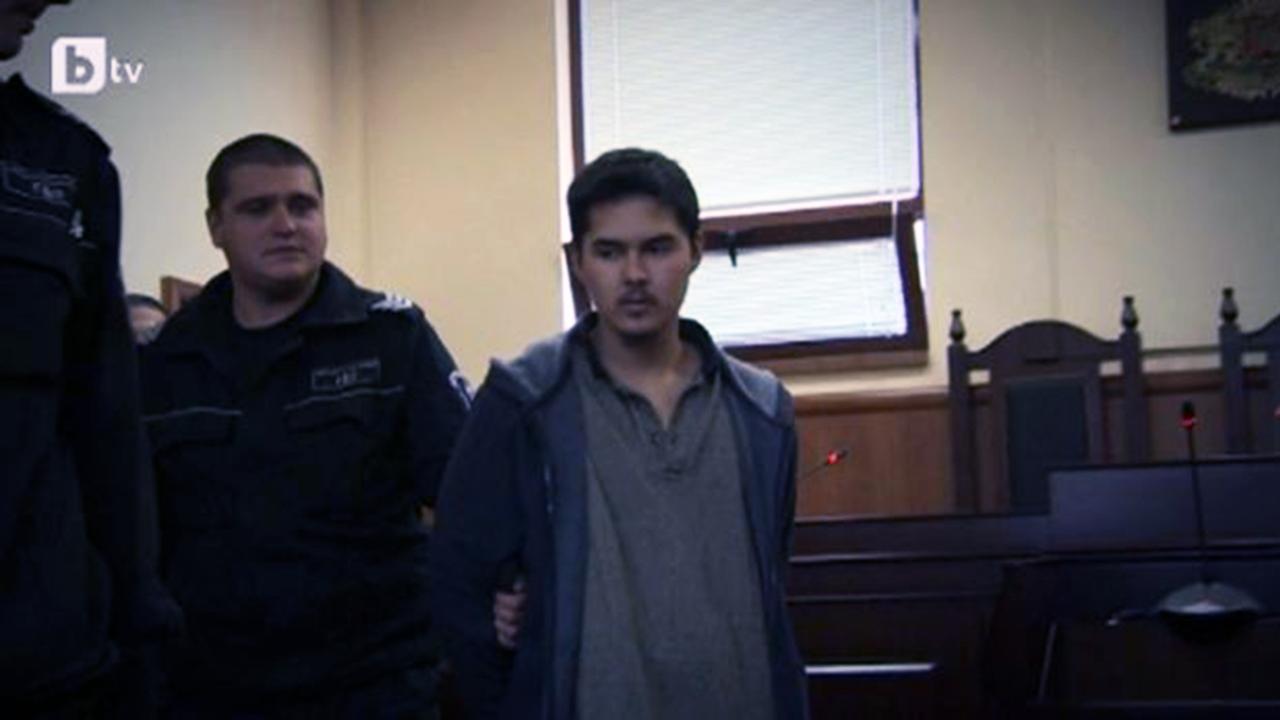
ACCUSATIONS AND LAMENTATIONS
Zahariev is accused of training as a terrorist in order to commit an attack on behalf of Islamic State.
He insisted he was “absolutely not’’ a terrorist and lashed out at Australia for “selling him’’ to the Bulgarians, who stormed his father’s flat and detained him on September 20.
“What kind of a terrorist am I?’’ he said in a courtroom interview last month.
“When they raided my apartment they found absolutely nothing, just religious material which even a previous expert said was normal religious material.’’
No firearms or explosives were found.
Whether Zahariev was just a bloke in the wrong place at the wrong time, or whether he is, as the Bulgarian authorities claim, a terrorist-in-training, preparing to launch an attack on behalf of jihadists Islamic State, could be known on Monday, June 5, when a court has scheduled a sentence date.
But what is clear is that the road that led Zahariev here, to handcuffs in the Sofia Special Criminal Court and a likely eight-year jail term, started many years ago, and is rooted in isolation, loneliness, and a young man looking for a purpose in all the wrong places.
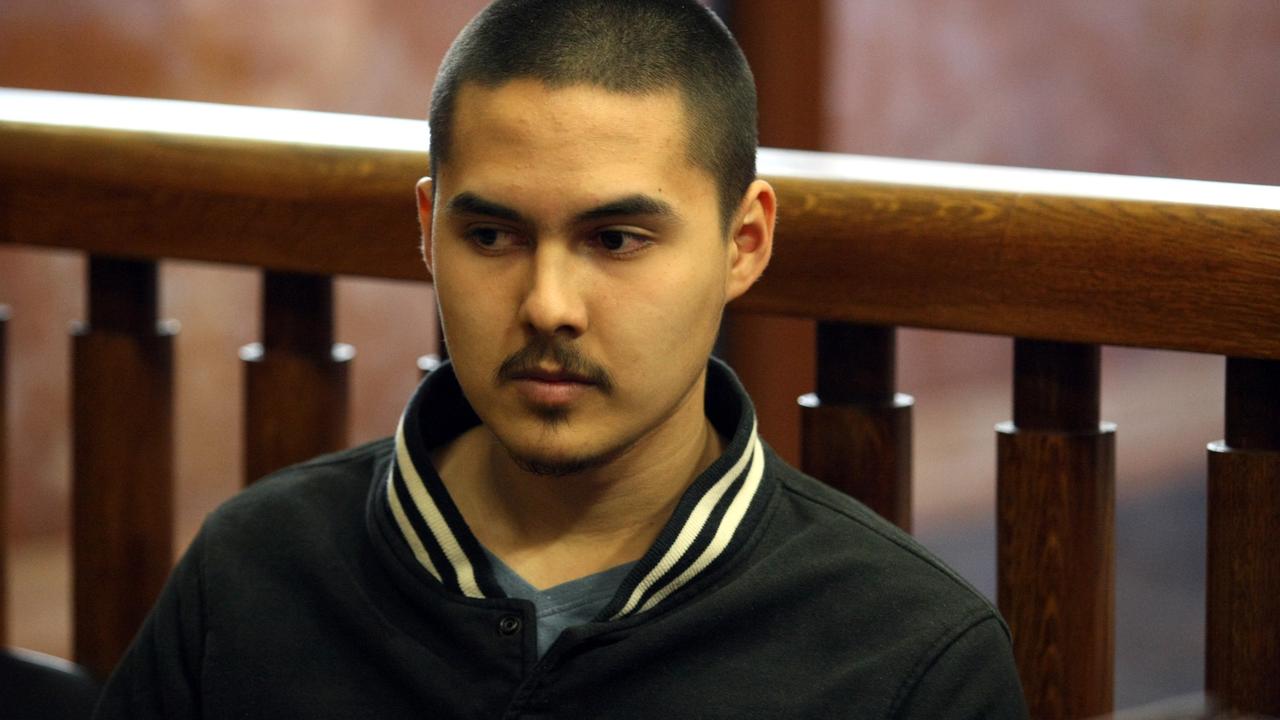
ZAHARIEV’S STORY
Slender, with a wispy moustache and looking even younger than his 21 years, John Zahariev is a dual Australian-Bulgarian citizen, also known as John Zakhariev, or Ivan Zahariev. These aren’t aliases, just different spellings of his name.
He was born in Vietnam to Vietnamese mother Anne Ngo and Bulgarian father Svetlomir Zahariev and spent some of his early childhood in India.
His father was a wealthy man, a diplomat who worked as the United Nations’ Food and Agriculture Organisation’s representative in Vietnam and who was 30 years older than his mother, a hairdresser and university graduate.
The family, which included a brother and a sister, moved to Sydney when John was very young, and obtained Australian citizenship.
Growing up, Zahariev had a privileged life, attending Waverley College in Sydney, an all-boys Catholic school in the wealthy eastern suburbs.
But he was an isolated boy and teenager, who struggled to learn English in his early years, was bullied as a small child, smothered by a strict and domineering father, and who lost his brother to alcoholism.
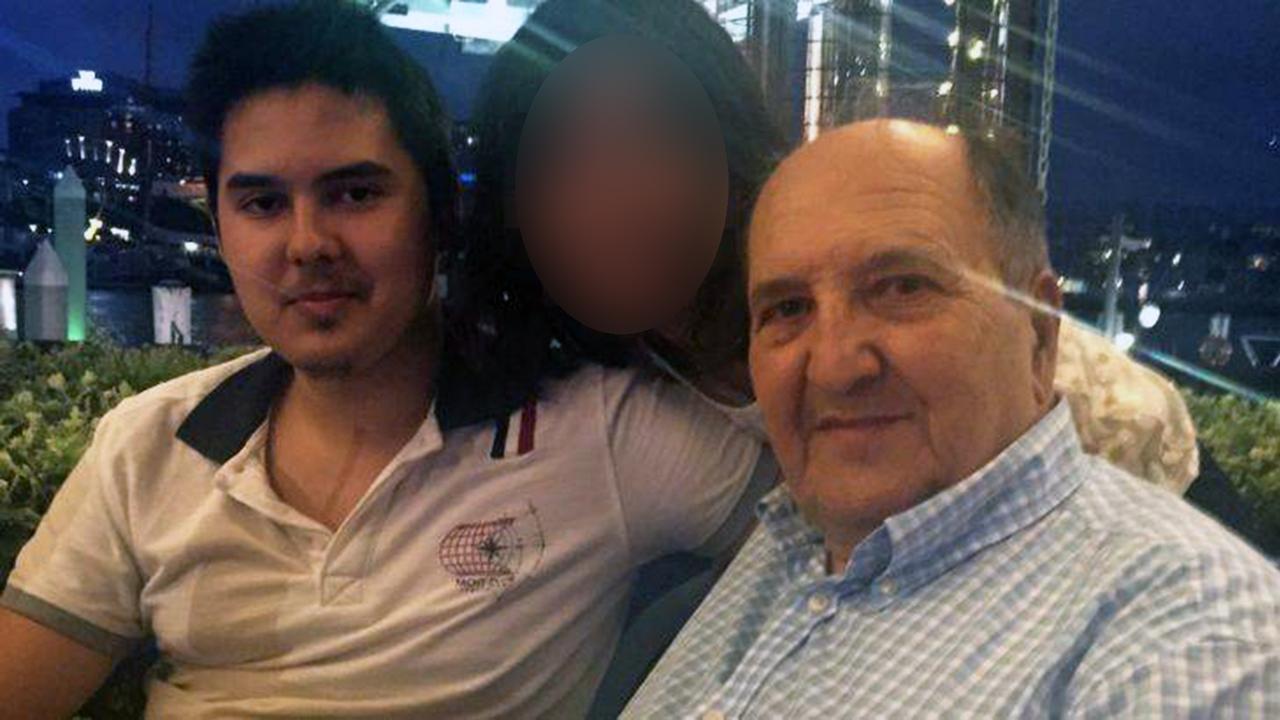
SINS OF THE FATHER
In an extraordinary interview aired on Bulgarian TV station Nova in October, his father told how his son grew from a lonely boy who would fiddle incessantly with wire coathangers, into a lonely teenager.
He had above-average IQ but struggled with communication and showed some autistic traits.
“That was absolutely clear to me long ago,’’ Mr Zahariev said.
“But I preferred to turn a blind eye to that and see instead the good traits in his character — he loved politics, he understood well the global situation. He had one weakness — he became short-tempered very quickly, he could not stand conflicts and opposing opinions. Since there were not many other people around him, all this got reflected in scandals (conflicts) with his mother and his sister.’’
His father also told how he intervened in his son’s fledgling romances because he didn’t approve of them.
“When he turned 17, some Italian girl appeared, but I warned him “No sex”. She was 15 and he was 17, this was a criminal offence. They went out and had some ice cream, but it seems that after she saw he was not very active as a man, she dumped him,’’ he told Nova.
“Then when he turned 18 I gave him money to go to a club. But then when he told me that an Iranian girl was interested in him, I was firm — ‘no way, sorry, any other girl, but not an Iranian girl’.’’
Mr Zahariev — who died in February at the age of 82 — also told how he wasn’t worried about his son’s lack of friends, because he never had any himself either.
“I don’t think it was good for him to have friends from the place where he was. At the college, after they graduated, one of his classmates turned gay, another one said he wanted to become prime minister of Australia, and yet another one became a drunkard. He said he did not need friends like this,’’ Mr Zahariev said.
He defended his position on his son’s isolation, saying: “Look at me; I have never had friends either.
“His mother used to criticise him for not having friends. She used to tell him: “You don’t have any friends, your father does not have any friends”. John replied: “Why do you say I have no friends? I can pick up the phone right now and five people will come here immediately and take me with their car.’’
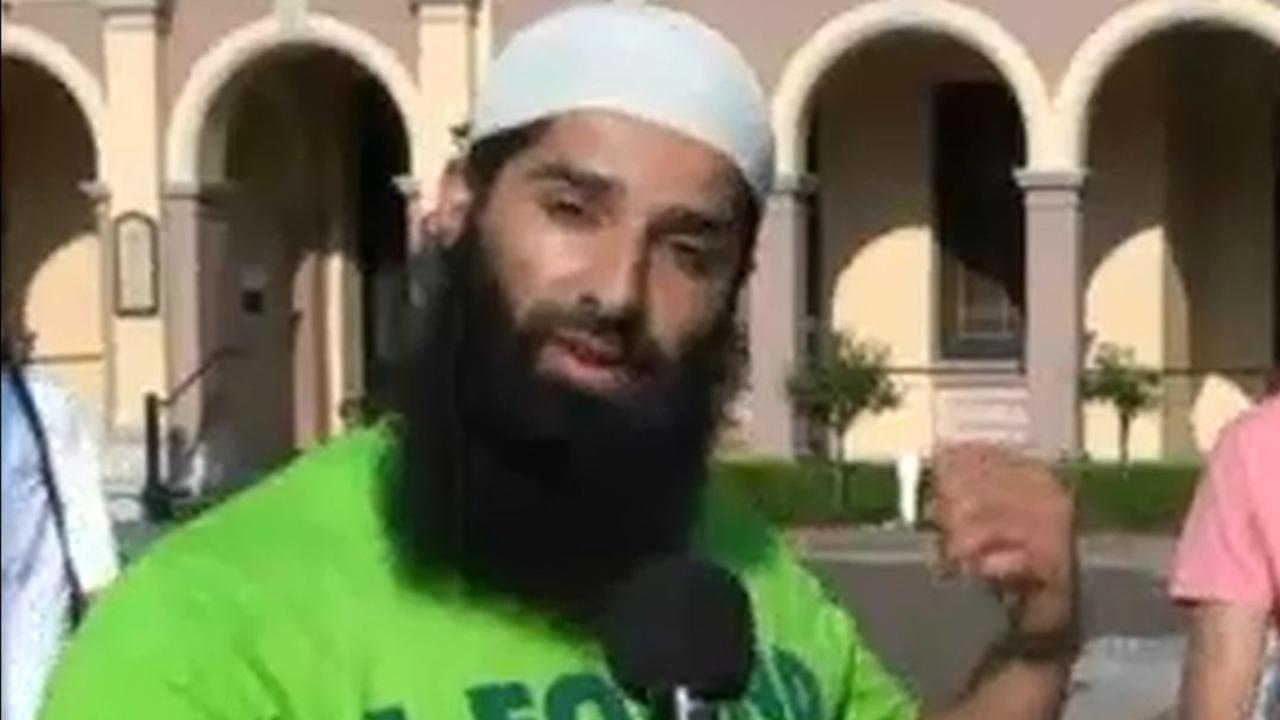
BETWEEN DARKNESS AND LIGHT
Those friends John Zahariev was referring to were connected with the Street Dawah, a Muslim preaching group based in Parramatta in Sydney’s west whose views were considered so dangerous and extreme they had been banned from preaching or handing out religious material.
Here, and with other Islamists online, John Zahariev found the friendship and interaction he’d been looking for most of his life.
“At one point a man from those groups came and brought with him another three strong men, he told John: ‘Do not be afraid. If anyone ever treats you bad, we will come from the other end of Sydney immediately and make sure they are done for,’’ his father told Nova.
(“They said) ‘You are our brother, our brother, our brother’.
“These words just got into his heart. He told me: ‘Now I finally have brothers, who are always ready to help me.’
“He started to trust them 100 per cent. They called him brother, he started calling them brothers too.’’
Zahariev’s involvement with radical Islam started after he graduated from Waverley College in 2012.
Disgusted by revelations about paedophile priests in the Catholic Church, he renounced the religion he’d grown up in and been schooled in, and converted to Islam.
He set up Facebook and Gmail accounts and spent hours on his laptop chatting online to his new friends about Islam, world politics and the conflict in Syria and Iraq.
But Street Dawah was being watched by authorities.
Their self-declared leader was Mohammad Ali Baryalei, and ASIO, the Australian Federal Police and New South Wales police were monitoring them closely.
Street preacher Baryalei, one of Australia’s most senior terrorism figures, was a recruiter for Islamic State, blamed for luring as many as 30 Australians to join the evil group in Syria and Iraq. He was also accused by authorities of being one of the masterminds of a plot to kill non-Muslims at random in Sydney early in 2014.
There were reports he was killed in October 2014 while fighting in the Middle East but authorities were never able to verify the reports.
At least half a dozen associates of Street Dawah have been charged with terrorism offences in Australia by the nation’s security agencies.
And now they were watching Zahariev too.
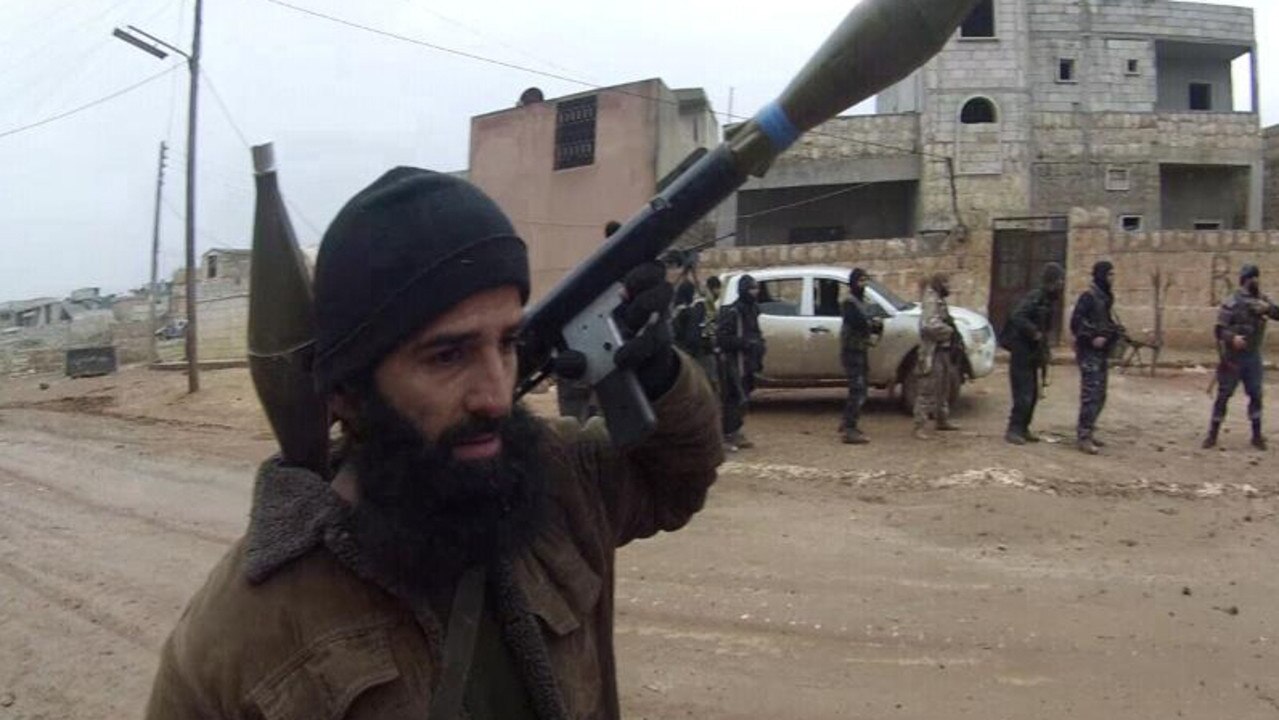
INTERLUDES AND EXAMINATIONS
In 2013, Zahariev travelled to Turkey and apparently crossed the border into Syria, spending eight days there before returning to Turkey and eventually, via a pre-planned European holiday, back to Australia, where he began studying at the University of Sydney.
Confusion surrounds this trip — Zahariev has previously confirmed it and said in a TV interview that: “I was very distressed seeing the images coming out of Syria and the stories. I wanted to go to see what the situation was, to see what I could do to help the Syrian people.”
His father, before he died, denied his son had even been there.
It was this trip, Bulgarian authorities say, when he was instructed by Islamic State to undergo terrorism training and carry out attacks on their behalf.
The spokeswoman for Bulgaria’s chief prosecutor’s office, Rumyana Arnaudova, alleged: “He had the intention to join a terrorist organisation on the territory of Syria.”
His father rejected this in his interview in October.
“I firmly deny the statement that he was a terrorist or a jihadist. He can be anything else, but not this,’’ he said.
While he had enrolled for a degree, Zahariev still hadn’t settled down, and was still spending hours with his online Street Dawah mates.
In 2015, he was stopped at the airport on his way to Bulgaria; ASIO pulled his passport and stopped him getting on the plane.
It was returned to him several weeks later, but Zahariev was becoming increasingly paranoid about the surveillance, and in January 2016, travelled to Morocco with a girlfriend.
He then decided to join his father, who had moved back to his country of birth for the final years of his life.
Frail and elderly, he was in receipt of a US pension from his United Nations days, which was subjected to tax in Australia. By moving to Bulgaria he could avoid the tax and stretch the pension a little further.
Mr Zahariev rented a flat on the top floor of a modern apartment building on Teofil Ganev Street in the Hadzhi Dimitar district. His son moved in with him sometime in 2016.
It was here, on September 20 last year, that a team of police and special agents raided the apartment and took John away.
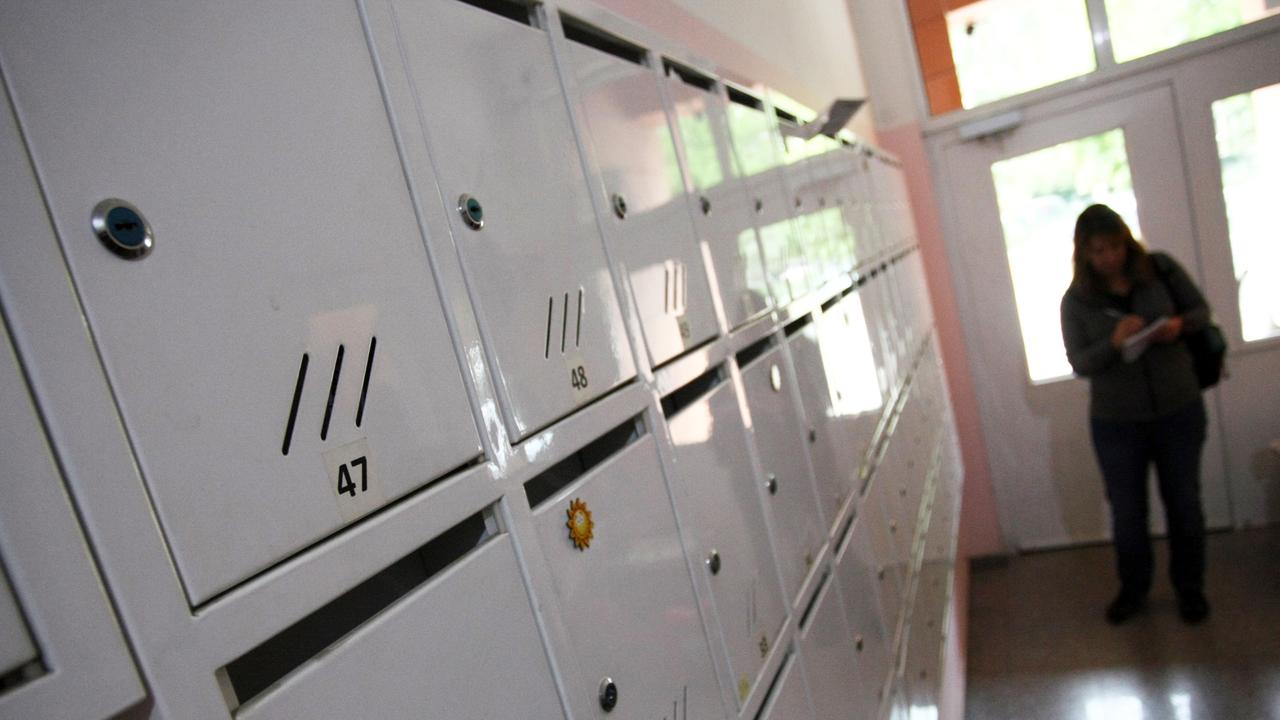
RAID AND REQUIEM
The caretaker at the apartment building remembered the raid.
“I saw John, he looked a very modest young person, very nice, he didn’t look like someone who would end up in court,’’ he told News Corp.
“Nobody knew what was going on. It was surprising to find so many policemen here. We did not know what was going on.
“Then we heard police had found Islamic books there.’’
His shocked father defended him publicly, and supported him in prison.
But early this year, he fell heavily in his apartment, and never regained his health.
“He was very old, Mr Zahariev,’’ the caretaker said.
“He found it very difficult to breathe. Then we found him on the floor in his bathroom. After his fall they put in him a hospice and he passed away there.’’
Svetlomir Zahariev died in February.
A short walk away from the apartment is a public shooting range called Levski, tucked away in the bottom of a stadium named after Georgi Asparunhov, Bulgaria’s greatest-ever football player. Tatty, with peeling paint and four beer bottles on a table outside at 8.30am, it’s a low-key venue, and John Zahariev spent time here in August and September last year with a man his father said was a “police provocateur.’’
Bulgarian authorities have presented these trips in evidence to the court.
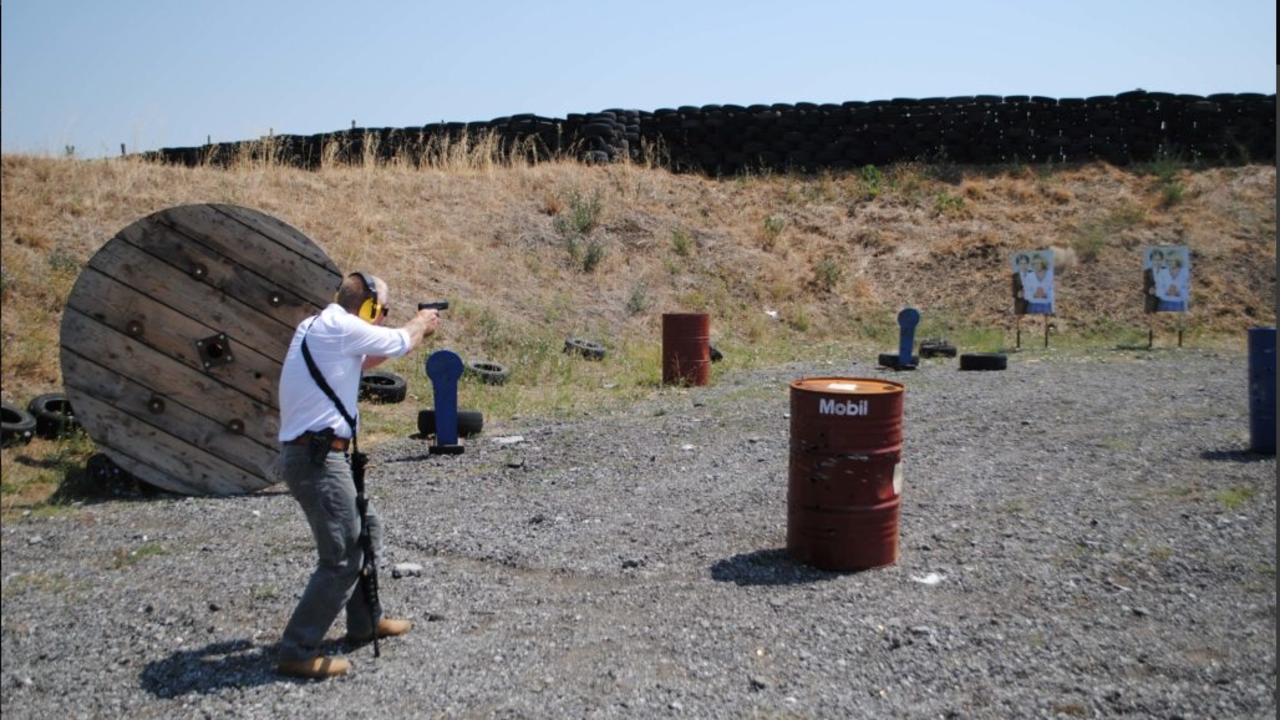
RITES OF PASSAGE
A man at the stadium wasn’t pleased to receive visitors and suggested News Corp return another time.
Ms Arnaudova from the chief prosecutor’s office said of one of the trips to Levski:
“Proof of his firm intention to be trained to kill is an accident at Sofia shooting range. He pointed the pistol directly at the instructor as if he was just to fire point-blank.
“We believe his aim was to put himself to the test, to feel the emotions he would feel when killing by firing point-blank.”
Mr Zahariev senior denied this, and said his son’s words had been misinterpreted.
“He asked the instructor: ‘Can I hang a photo of (Syrian dictator Bashar al-) Assad on the target’?’’ he told Nova TV.
“The terror charges are the result of police provocateurs who were very successfully instilled in our family.
“These police provocateurs offered him to take him here (to the shooting range in Sofia), they offered to train him shooting and now doom him with what they call “evidence”.
“They told him: ‘You want to shoot? No problem. We will take you to a place nearby.’’
Mr Zahariev said after the shooting trip, his son had been “almost ecstatic with happiness.’’
“He told me: ‘I am a real man now, I finally held a real pistol in my hand, I was finally able to shoot with real bullets!’
“He was kind of not himself. ‘Dad, I held a real pistol! I am a real man, nothing else matters’!”
John Zahariev had long had an interest in guns, although maintains to this day that while he went recreational shooting for fun, he never trained to use a gun, and was so ill-equipped he couldn’t even load them himself.
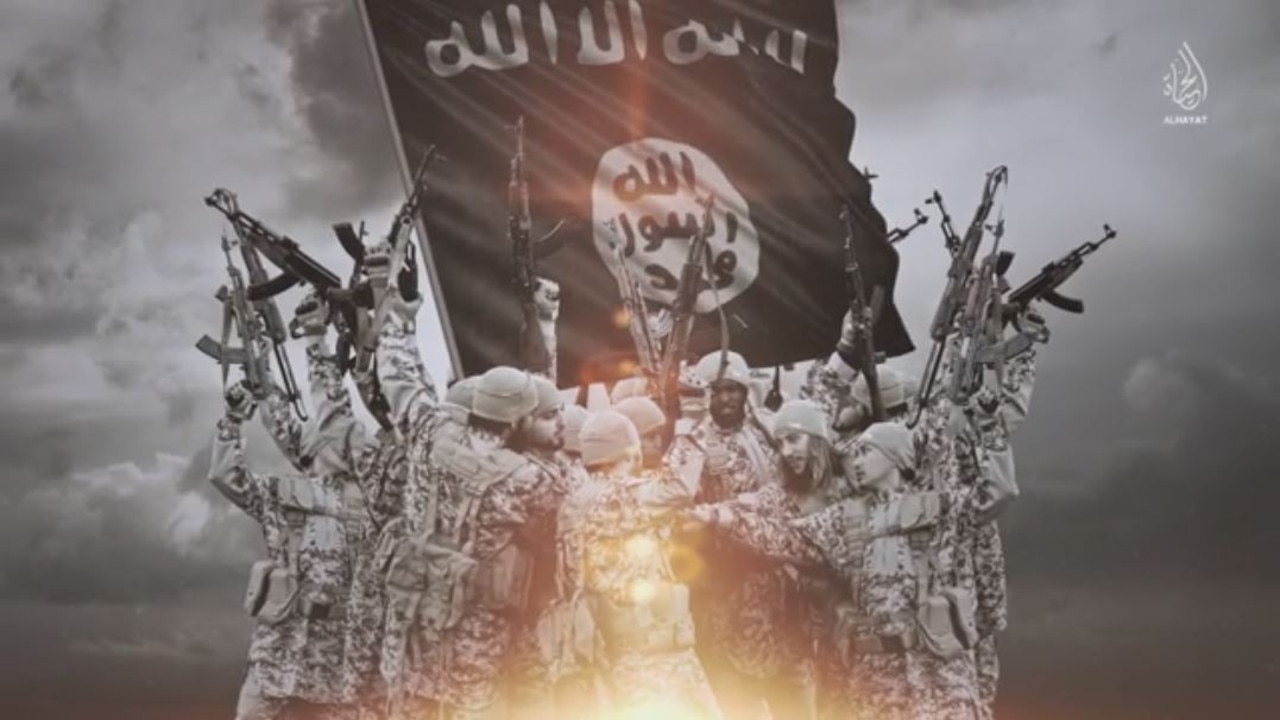
DIVIDED LOYALTIES
While at Waverley College, he spent four years in a cadet corps, and, according to his father, wanted to join the army.
“They told him that after three or four years, all students will be taken to a shooting range and be trained to shoot,’’ his father said.
“This was, however, the case during the Cold War, now things are very different. There is now no shooting, no arms. At this point he got disappointed. He said he dreamt to have a real pistol. He even bought a toy, a Kalashnikov, powered by batteries. Even his photo on Facebook, he is in uniform and his hand is like he is reacting to an order. He was very proud to be part of the cadet unit. He had this dream to shoot.’’
His father said he was not troubled by his son’s apparent fixation on guns.
“For a person who was getting ready to join the army, that was absolutely natural. This is also our family tradition. His grandfather was a Lieutenant Colonel. The passion for the army is in his blood. That was his future.
“John dreamt of joining the army, but during his time at the cadet corps he was assigned to the sanitary unit and he got rejected, slammed as not eligible to become an officer. He was very disappointed. The he tried to take up a number of jobs, four or five, but they all fired him after two or three weeks. The employers were unhappy with his performance.’’
By July and August last year, John Zahareiv said he had become disillusioned with Islam and the misleading words from his Islamist Facebook friends.
He told the court he renounced the religion, and returned to Christianity.
His friends became enemies online and while he still spent hours in front of his laptop, this time he was arguing with the Islamists, criticising them and their world view, and renouncing extremism.
Still, he continued to go shooting.
In August, in Plovdiv in central Bulgaria, he met up with Kristina Georgieva.
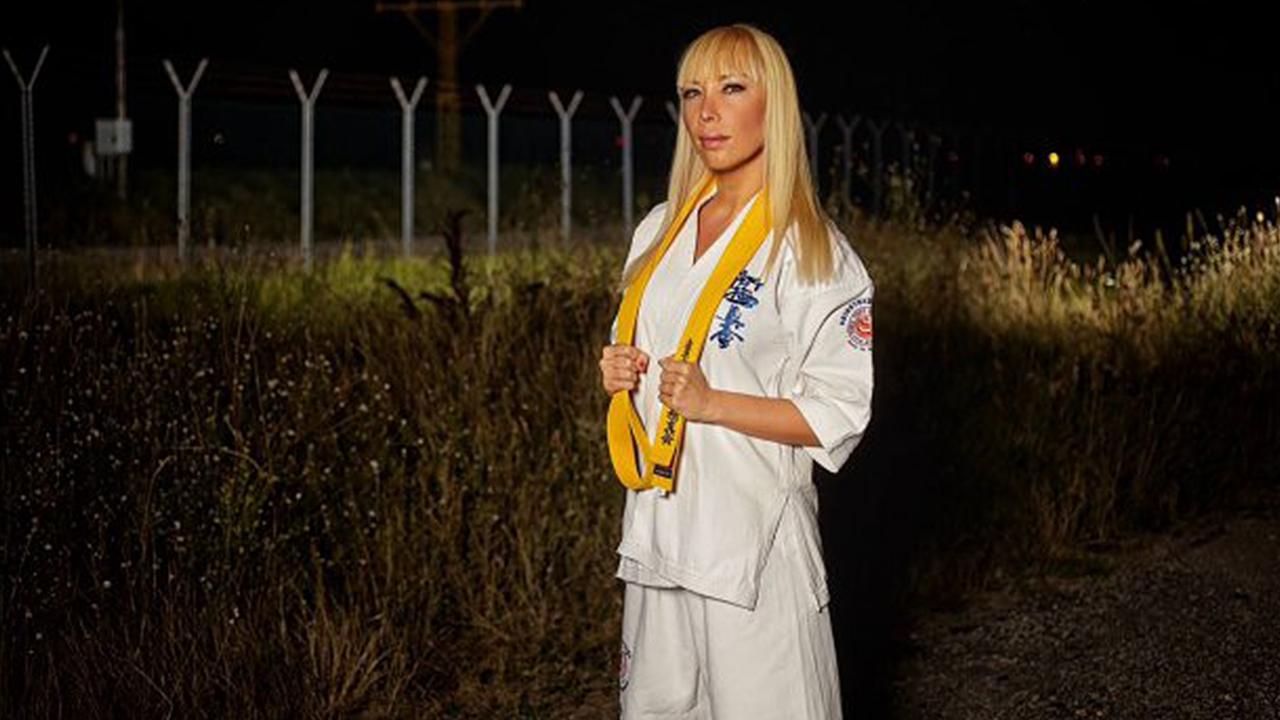
POINT OF NO RETURN
The Hotel Expo is a pleasant, modern, mid-range hotel about a 10-minute walk from the historic old town.
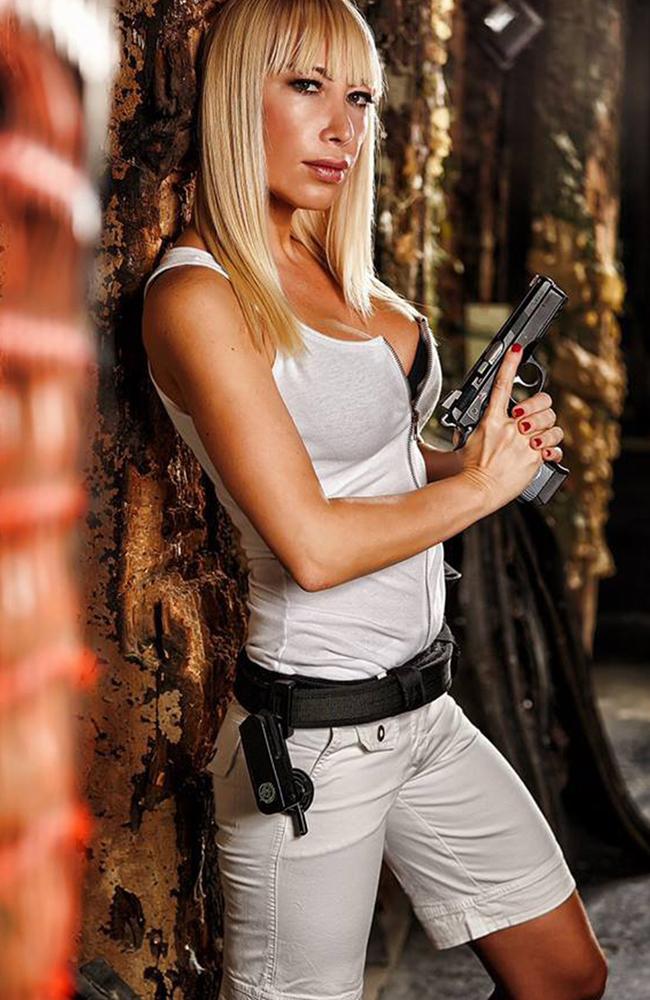
Zahariev was staying here when he met Ms Georgieva, and together they went to the 360 Degree Shooting and Training Centre, in the village of Voyvodinovo, outside Plovdiv.
Ms Georgieva has given evidence in court about their visit, saying she had met the Australian “by chance’’ outside the hotel, and got chatting, where Zahariev disclosed his interest in shooting.
The blonde bombshell was a member of a club that uses the 360 shooting centre and had been shooting there for years, so she took him to visit.
According to media reports of her testimony, she said Zahariev was not accomplished at long-distance shooting and she believed he wanted to shoot at closer targets, but she dissuaded him due to the risk of ricochet.
He wanted to shoot with a Kalashnikov, and as she was not experienced with this weapon, she called an instructor to help.
Reports also quoted Ms Georgieva as saying Zahariev dropped bullets on the ground, which was unusual, and wanted to take some as souvenirs, which was forbidden.
The reports said he also asked her to take a photograph of him at the range on her phone.
“I took a picture of him with the Kalashnikov and the weapon with which I train,’’ she said.
At the end, Zahariev told her he liked it and gave her his Facebook details.
(The fumbling with the bullets fits with Zahariev’s evidence in court, where he argued he did not know how to shoot a weapon, had never trained with it, and was so inexperienced he needed help from an instructor.)
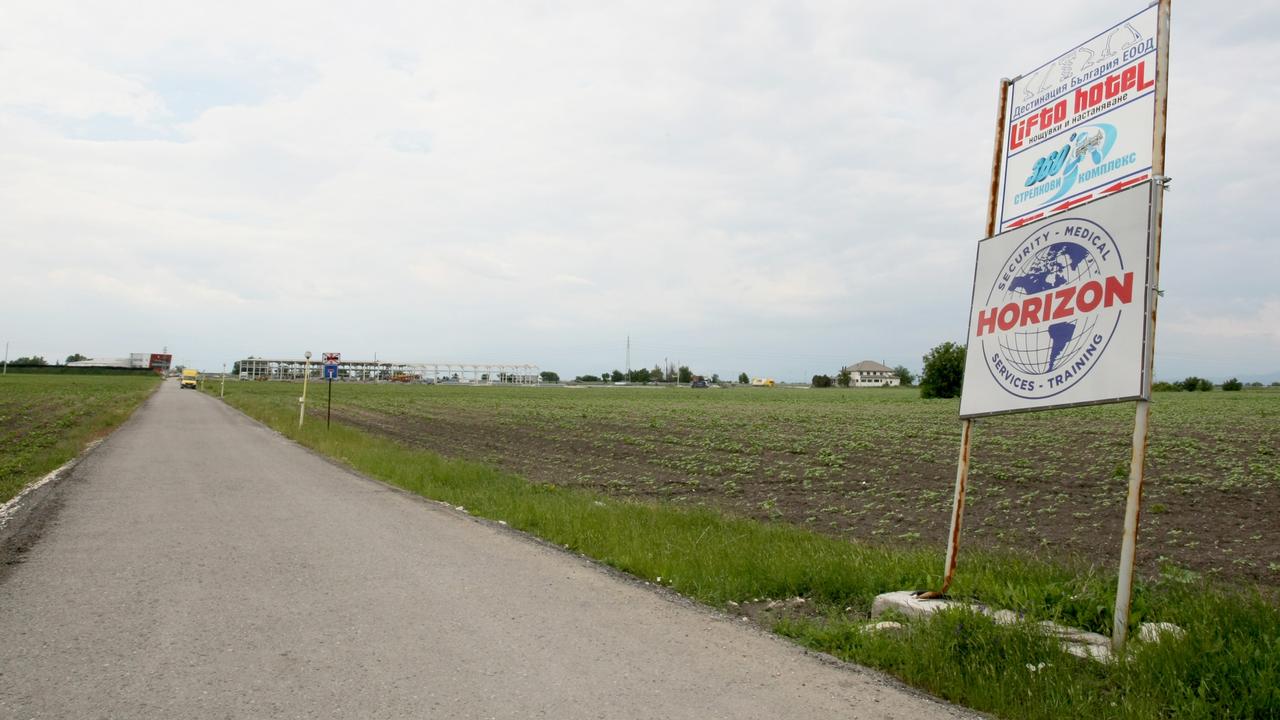
A SHOT IN THE DARK
Hotel Expo owner-manager Plamen Sirakov told News Corp he was surprised to see television news reports showing his former guest had been charged with terrorism offences.
“There was very much reporting on this case. I even recognised his face,’’ he said.
“As the owner I spend my time here and when I have a guest stay for two or three days I remember them.
“I do remember coming across him. He came down for breakfast and he took walks.
“It was not much later that the case emerged.’’
Mr Sirakov said Zahariev did nothing to stand out and was just a regular guest.
“There was nothing special, he was a normal average guest of the hotel,’’ he said.
“I even expected that maybe the authorities would seek my co-operation but it did not happen.’’
Online, the 360 Degree Shooting and Training Centre proudly declares itself southeast Europe’s top military and civilian shooting centre. Its professional-looking website, in English, outlines course, accommodation and training facilities, features photos of men armed with automatic weapons, and spruiks for international customers. It even includes photographs of Hollywood action heroes Arnold Schwarzenegger and Sylvester Stallone.
And yet it’s a strange place, up a long, dusty driveway with just a discreet “360’’ sign on the roadway, tucked into the side of a transport company warehouse, where a large dog barks at the door and a chicken runs across the driveway.
Inside, a young man said he was aware of the case and of John Zahariev, but asked News Corp to wait for the manager.
Three men then turned up, with one aggressively disputing that Zahariev had ever been there.
“What position are you in to ask me any questions?’’ a large man in tracksuit pants asked in Bulgarian.
“He has never been here.’’
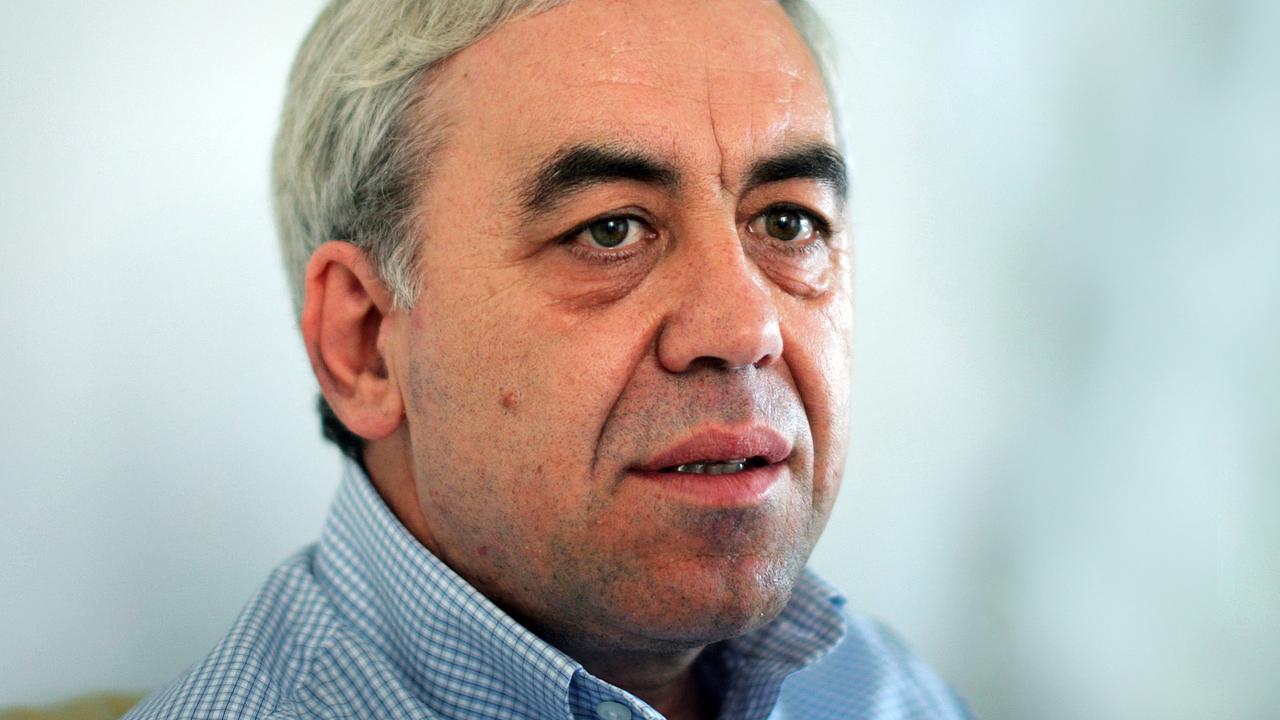
ILLUSIONS AND TRUTH
Krassimir Kanev is the chairman of the Bulgarian Helsinki Committee, a leading human rights advocacy group in Sofia and has spent time with Zahariev’s family, supporting their son.
He believes Zahariev’s claims that he was set up, with Bulgarian authorities unable to make the case without “planting’’ people to gather evidence.
“From what I heard from him he was saying that it was completely made up,’’ he told News Corp.
“The charges, the evidence, (designed) to present our security forces as going hard on the terrorists.
“In reality, there was no crime.’’
Mr Kanev said he had never been able to access any documents relating to Zahariev’s case, including the formal indictments.
But as far back as April, he had no doubts as to how the case would end up.
“I expect him to be sentenced.’’
Mr Kanev said there was doubt over Zahariev’s citizenship status, with Mr Zahariev telling him his son never renewed his Bulgarian passport.
“The alleged crimes are supposed to have taken place in Turkey and Syria,’’ he said.
“If he’s not a Bulgarian citizen they (authorities) would not have the jurisdiction.’’
Mr Kanev said Mr Zahariev had told him his son was “working’’ for the police back in Australia and indeed Zahariev has said publicly he wished to work with ASIO to provide information on Islamism.
“They have planted several persons who were following him, according to his father,’’ Mr Kanev said.
“To go to the shooting range in Plovdiv he was brought there under very suspicious circumstances.’’
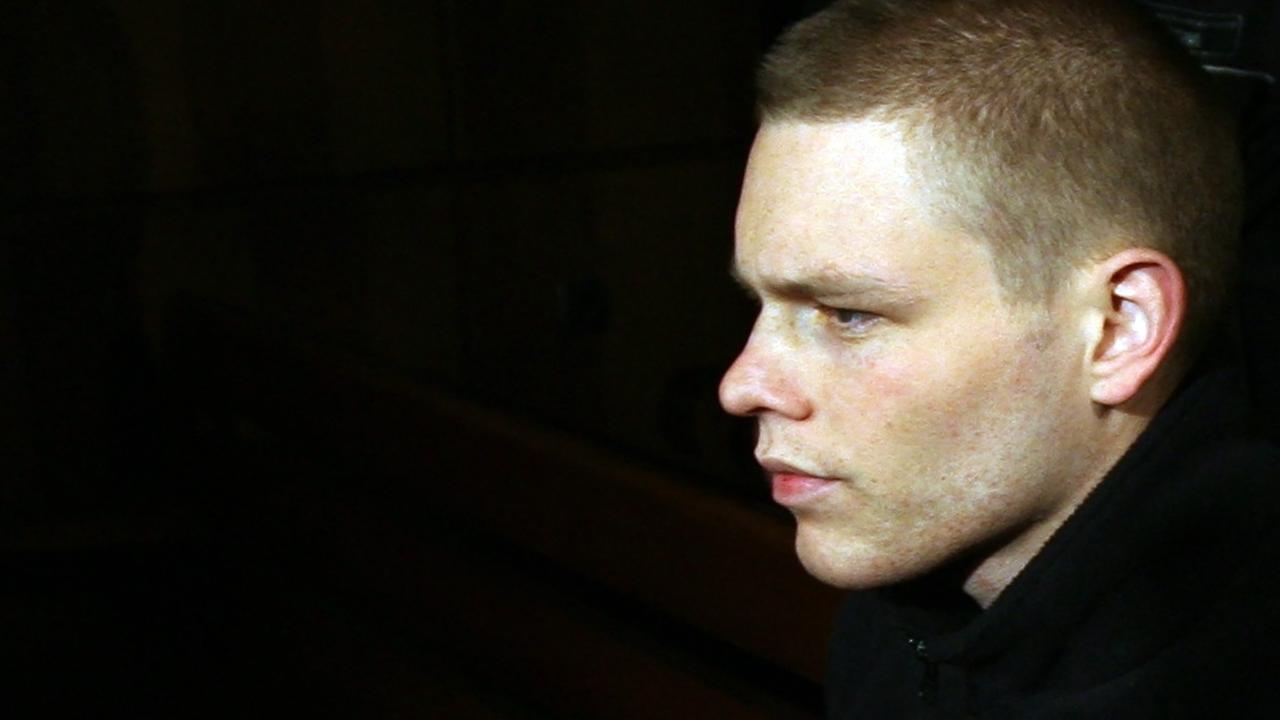
DIVERGENT PERSPECTIVES
Mr Kanev said Zahariev had “met a lady’’ who spoke English outside his hotel, who had taken him to the shooting range.
“I remember one interesting incident that convinced me he was really framed,’’ he said.
“When he went to Plovdiv he hired a hotel room then he went out and near the hotel he met a lady and started a conversation and asked her if she knew a place where he could shoot.
“She spoke English and took him to the range which was not in Plovdiv but in a village nearby.
“According to the prosecutor this was following up the recommendations of the jihadists he met in Syria, instructing him to train in shooting.’’
He said Zahariev’s mother Anne Ngo was undergoing cancer treatment and could only travel to see her son between chemotherapy sessions, and was isolated and alone in Bulgaria when she did visit.
He assigned a staff member, Dilyana Angelova, to assist Ms Ngo.
“On her first visit to the prison I accompanied her,’’ Ms Angelova told News Corp.
She said mother and son spoke for 40 minutes, the maximum allowable, with glass separating them, through a telephone.
His older sister Nevena had also visited him.
Ms Ngo was very unwell, and had to queue in a security line to enter the prison for two hours, and Ms Angelova said Zahariev had been very worried for his mother’s health.
“He looked well,’’ she said of Zahariev, who has spoken about how difficult he is finding it inside the prison.
“He talked to me about the Australian prisoner he had met, he received support from Jock.’’
Jock Palfreeman is another Australian who is serving 20 years for murder after he killed a man in a street fight in Bulgaria 10 years ago.
Zahariev said in court in May that Palfreeman was a good man, but held in another area of the prison, with a very different case, and therefore could not assist him.
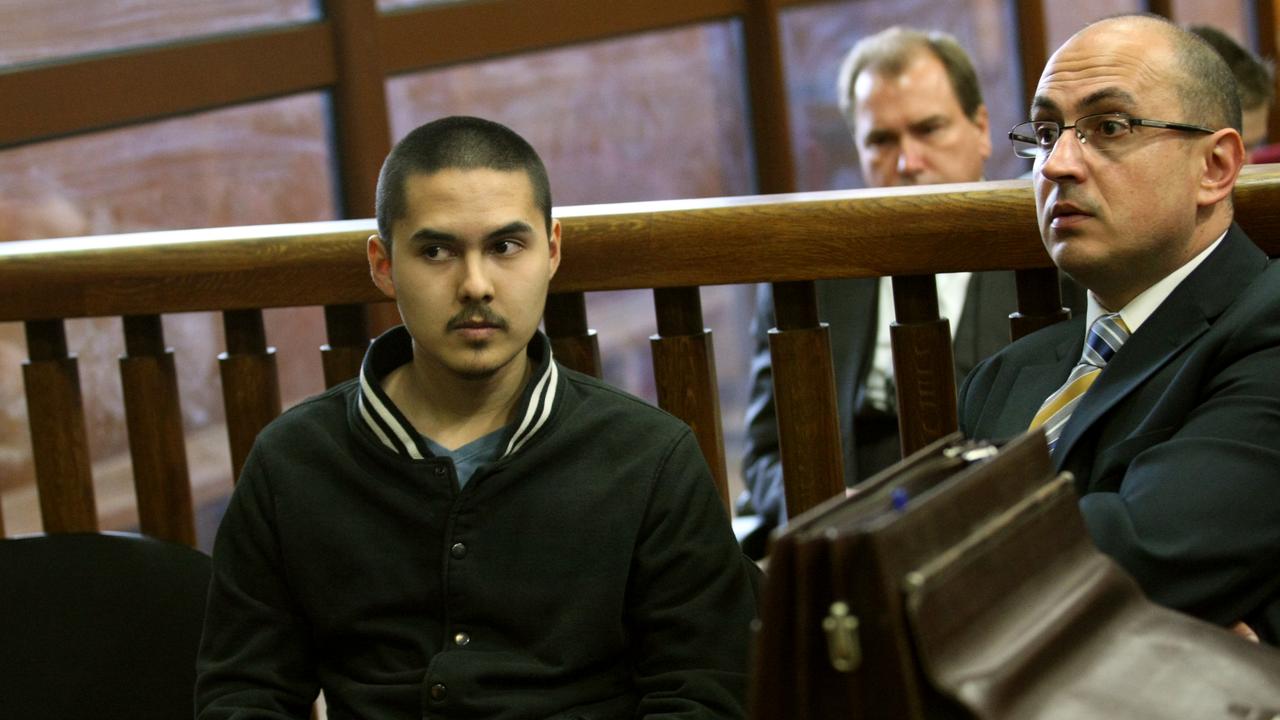
BUILDING A CASE
Mr Kanev said terrorism cases were highly unusual in Bulgaria.
He said the only terrorism incident in Bulgaria had been a “Hezbollah’’ attack on a group of Israelis, planned outside Bulgaria on non-Bulgarian citizens, but carried out on Bulgarian soil.
He was referring to the July 18, 2012 attack in which six people were killed and another 32 injured by a suicide bomber who blew up an Israeli tour bus at the airport in the resort city of Burgas.
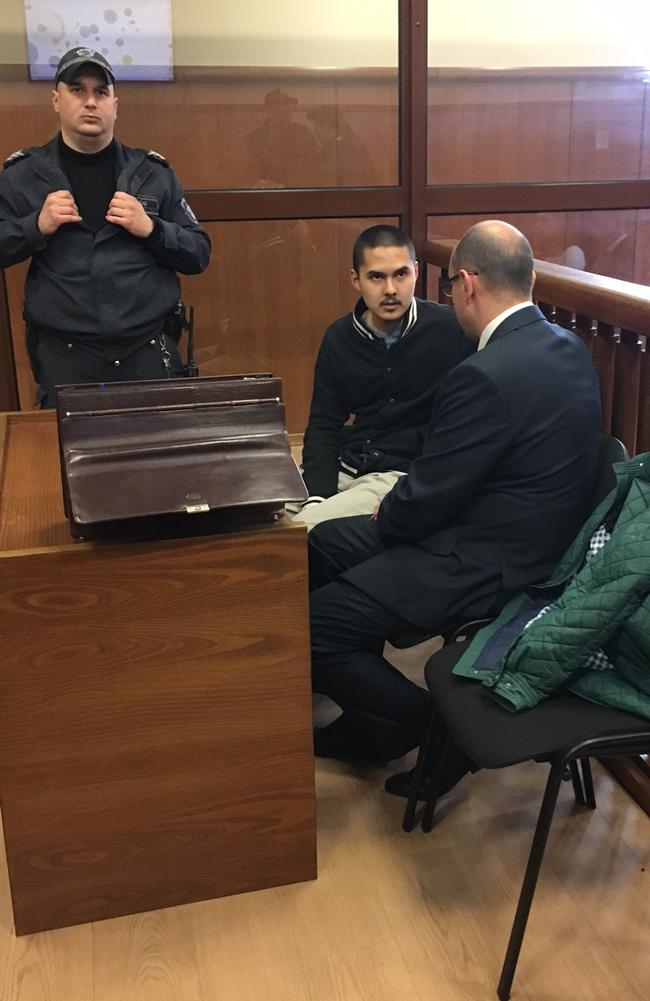
“Other attacks on public buildings or Bulgarian citizens, it has never been the case,’’ Mr Kanev said.
He strongly defended Zahariev, saying he had no prior criminal history, had killed no-one, had been denied properly translated evidence briefs, had been set up by secret agents, and was being held in an outdated prison with 900 others, with whom he did not share a common language.
“A lot of people cross the border; it doesn’t prove they are a terrorist,’’ he said about the Syrian trip in 2013.
Since Zahariev made his first appearance in the Bulgarian Special Criminal Court, it feels as though he has been marching slowly but surely towards a guilty verdict.
His indictment has not been released publicly, although local media reported he had been charged with “undertaking firearms training with the intention of committing a terrorist act.’’
He has twice been set down for sentence despite no formal finding of guilt against him.
His Bulgarian lawyer, Hristo Botev, said he was “not very hopeful.’’
A deflated Zahariev himself, speaking after the court refused to look at other Gmail and Facebook Messenger accounts where he said he was criticising Islam and renouncing extremism, said: “I think I’ll definitely be facing a guilty verdict, now how many years I’m going to get I don’t know.’’
Mr Kanev said he believed Zahariev was almost certainly heading towards the maximum eight-year jail term spelled out in anti-terror legislation.
“Being freed? It almost never happens.’’
He said once a person had been remanded in prison, they could take action against the Bulgarian authorities if they were found not guilty. He said this corresponded with the fact Bulgaria had a very high conviction rate, over 90 per cent.
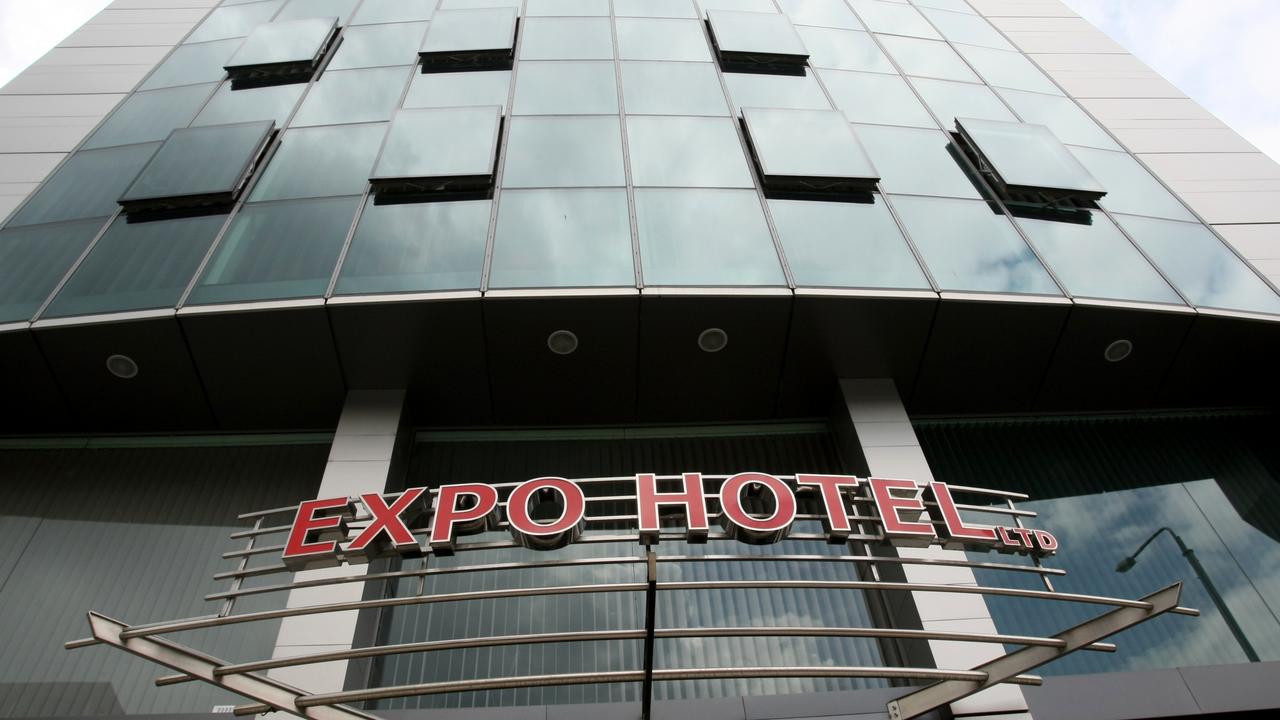
FOR AND AGAINST
It was a letter from Australia that got Bulgaria, a member of the European Union, interested in John Zahariev in the first place.
Sent last year, it informed the Bulgarians the dual national had been in Syria in 2013 and was “interested in terrorism.’’
Zahariev said the fact he had converted away from Islam in the two months before he was arrested, had denounced and challenged Muslim extremism online, and offered to work with ASIO, Australia’s domestic spy agency, was not being taken into account.
He asked for Australia to help him, to provide consular assistance, and to consider allowing him to serve any jail at home in Australia, where he could be nearer to his mother and sister.
“You know the way the Bulgarian prison system is designed, it’s not designed to rehabilitate people,’’ he said.
“They lock us up for 22 hours a day without giving us much to pass the time and this is in stark contrast to the prison system in Australia where everything’s focused on rehabilitation so you don’t reoffend when you’re released.
“I have consular visits once every three months or four months just to check I am alive and doing well but as happened in the case of Jock Palfreeman the consulate actually came to all his court appearances,’’ he said, adding that by contrast, the Australian consulate hadn’t been to any of his appearances.
“No one from ASIO or AFP has come to see me, I think probably they’re just embarrassed it’s them that actually put me in this predicament in the first place.
“I would ask our government to aid me, perhaps when I am sentenced, to send me back there so even if I am in prison there I can actually do things to pass the time,’’ he said.
“I would make this appeal to the Australian Government to actually do something to aid me and I think they have a moral obligation to do so considering it was ASIO that actually sold me to Bulgaria in the first place.’’
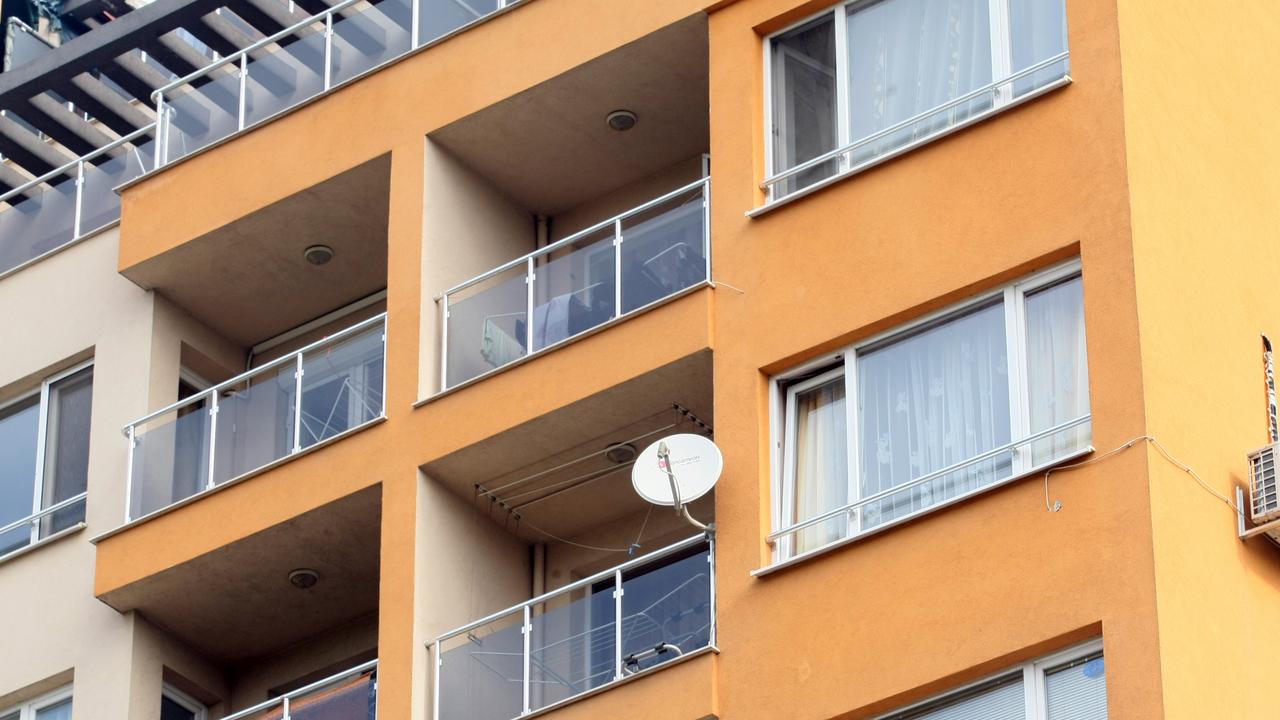
‘THIS IS VERY DANGEROUS’
Svetlomir Zahariev, in his extraordinary voice-from-the-grave documentary, said that in the months his son lived with him, he spent many hours online.
Neither of them knew the Bulgarian authorities had bugged their apartment building.
“Throughout all this time he was constantly here at home with me,’’ he said.
“He told me he got into contact with one group, which is banned in Russia and the US for being allegedly an Islamist group. He started writing a novel, it was just fiction, on the topic of Islamism.
“He writes that as a kid he was very much loved, but as he grew older, things were becoming more and more difficult. He was becoming more and more impatient and started to have outbursts of anger.
“When I saw him getting really emotionally involved in the Muslim things, the camps, I told him: ‘stop it, please, things are getting out of control, this is very dangerous.’
“I asked him what his intentions were. He said: ‘My intentions were to describe how life is on the other side, the life of those who fight for freedom and democracy.’
“Terrorism has never been among his topics. And he stopped and he even promised to delete this file from his computer, but he did not delete it and now he is paying a high price for that.’’
Mr Zahariev was asked if the friends John made online were his son’s “first true friends.’’
“You are right,’’ he replied.
“Up to that point he was close only with me. That did not worry me; on the contrary I was happy because he was in my camp.
“It was all about what I teach him, what I showed him and it was my aim to make him a good person, a reasonable person, to develop in the direction in which I wanted him to develop.
“I wanted him to be a politician, a diplomat, what I was.
“My ambition was that my daughter Nevena will become a diplomat and my son a general in Australia’s Army. However ... nothing came out of my ambitions. And maybe this is all my fault.’’
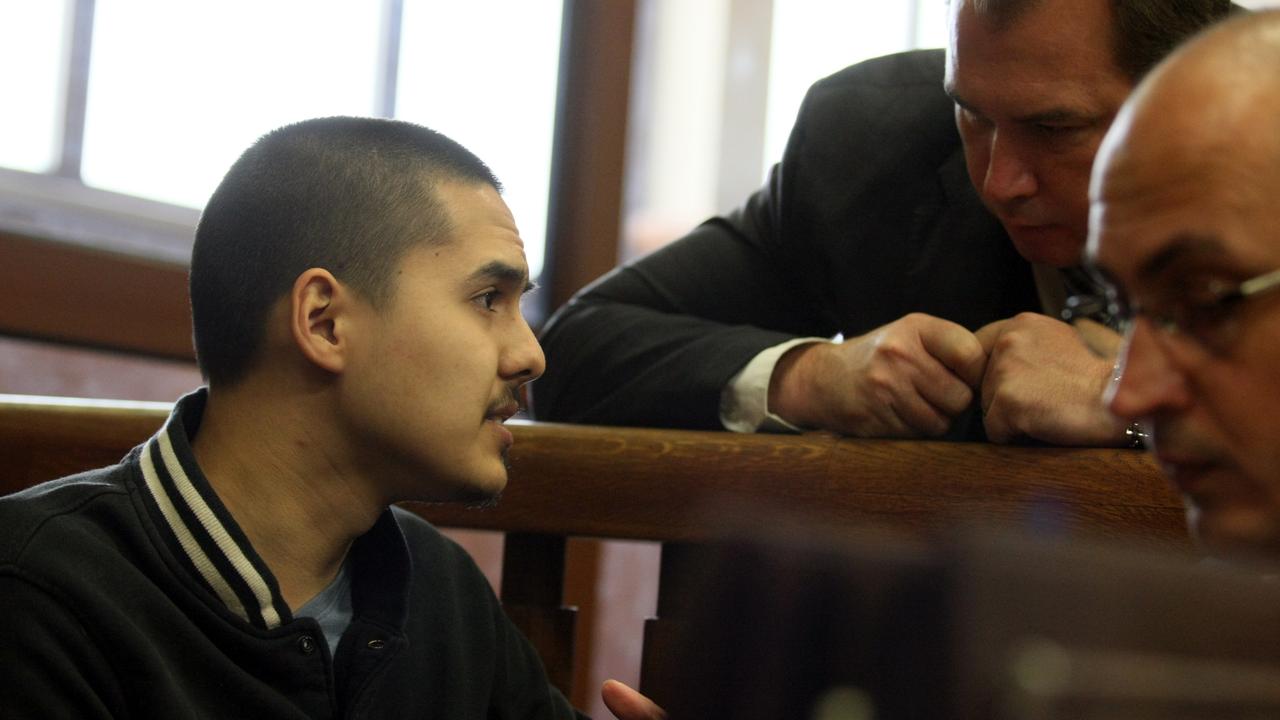
‘IT’S ALL MY FAULT’
His father said he believed John’s flirtation with Islamic fundamentalism was his son’s “revolt’’ against the way he had wanted him to live his life, and he beat his forehead repeatedly on camera as he blamed himself for his son’s incarceration.
“It’s all my fault. I was very confident and believed in myself, I thought I am doing only good for my kids. But it turns out this was not,’’ he said.
“I had to keep him away from Bulgaria, I had to guess in advance that the Australian services will never give up following him. It does not take a genius to guess that the Australian services would tell their Bulgarian counterparts: “Look, there is this boy, he seems suspicious to us, can you check him out?’
“Now I feel a complete failure, catastrophe. I used to work at UN for 22 years, nine years as a diplomat, at the end it turns out I have achieved nothing.
“That’s absolute failure. The only thing I can do is shoot myself in the head.’’
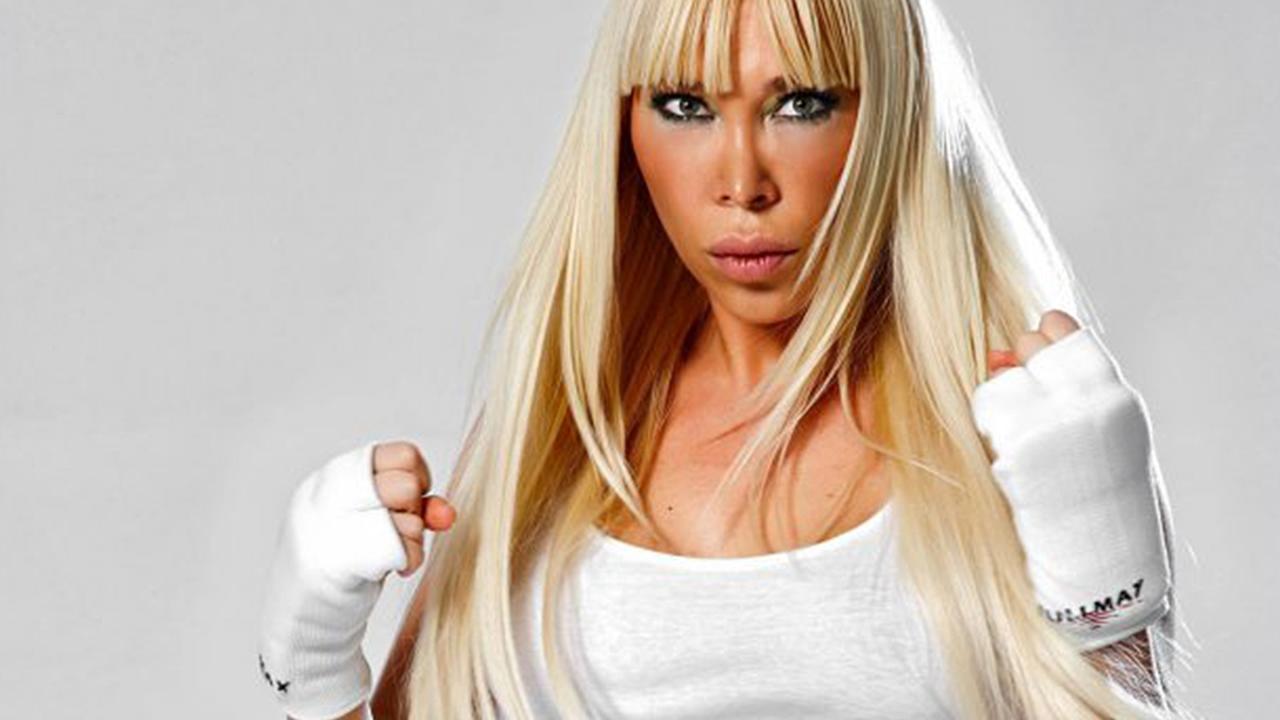

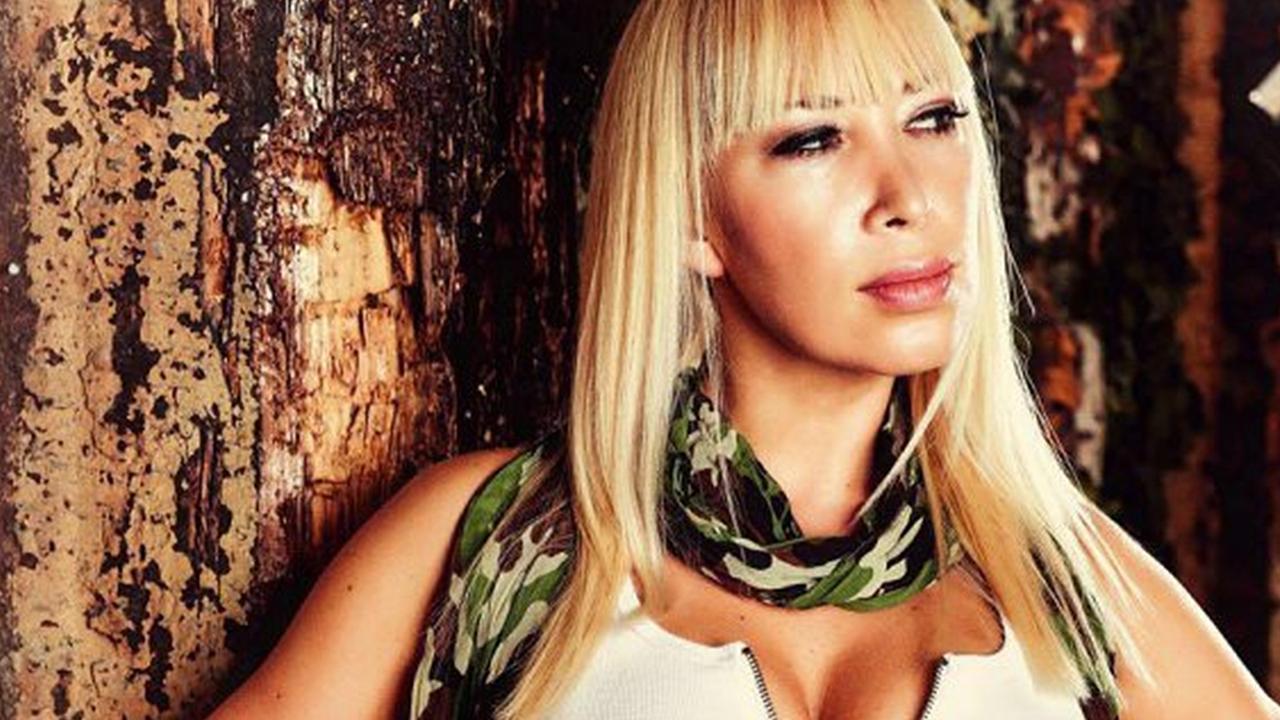
Add your comment to this story
To join the conversation, please log in. Don't have an account? Register
Join the conversation, you are commenting as Logout
Here’s what you can expect with tomorrow’s Parramatta weather
As summer moves towards autumn what can locals expect tomorrow? We have the latest word from the Weather Bureau.
Here’s what you can expect with tomorrow’s Parramatta weather
As summer moves towards autumn what can locals expect tomorrow? We have the latest word from the Weather Bureau.